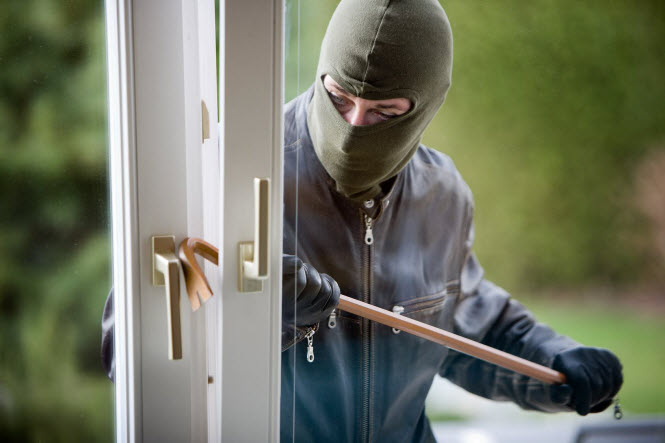 On the surface it seems to be an easy case and relatively straightforward. On May 1, 2011, Richard Rodriguez broke into the storage closet in an inhabited residence.
On the surface it seems to be an easy case and relatively straightforward. On May 1, 2011, Richard Rodriguez broke into the storage closet in an inhabited residence.
According to Deputy District Attorney Robin Johnson, he went in there with the intent to steal, however, the burglary was thwarted before he had the chance to take anything. The light went on outside, he ran off and was subsequently arrested and charged with first degree burglary.
The problem with sustaining the burglary charge is if you look at California Penal Code Section 459 which states: “Every person who enters any house… with intent to commit grand or petit larceny or any felony is guilty of burglary.”
The key, as Deputy Public Defender David Muller argued, is “intent.” Burglary, he argued, is a crime that requires the specific intent either to steal or commit another felony. Mr. Muller does not dispute that his client had broken into the storage locker, but in terms of the specific intent, he argued that the logic chain was missing.
He argued that there was no sign of forcible entry into the storage closet. There is no evidence that any property was taken from the storage closet.
Further, he argued, there is no evidence that Mr. Rodriguez was found in possession of burglary tools or any other items associated with committing a theft.
He argued, “The only evidence of defendant’s guilt, presented by the People, is that witness McNeil saw defendant inside her storage closet in the early morning hours, and this storage closet was an area he was not permitted to be in.”
In other words, he would argue that the people have only presented evidence of an unlawful entry of an occupied residence, not a burglary.
In his closing argument, he told the jury that what the people had actually proven was not burglary, but rather, aggravated trespassing.
Penal Code section 602.5(b) reads, “Every person other than a public officer or employee acting within the course and scope of his or her employment in performance of a duty imposed by law, who enters or remains in any noncommercial dwelling house … without the consent of the owner, his or her agent, or the person in lawful possession thereof … while a resident … is present at any time during the course of the incident is guilty of aggravated trespass …. “
What makes this a more interesting case is that Deputy DA Robin Johnson had a point when she made the argument that the statute does not require Mr. Rodriguez to have actually stolen anything, but merely to enter with the intent to steal. As soon as he enters the property, he is guilty of the crime of first degree burglary.
She made the standard prosecutorial argument that if Mr. Muller’s standard of proof beyond a reasonable doubt were adhered to, that there would be no one convicted of burglary who did not have time to steal. That Mr. Rodriguez should not benefit merely because he was unsuccessful.
She made the point that, while it turned out that he broke into the storage closet, there is no way in the dark that he could have known that he was breaking into a storage closet rather than the residence.
But Mr. Muller can counter that if the legislature had wanted the definition of a burglary to simply be an unlawful entry into a home, then the legislature would not have written into the statute the element of the crime that requires there be a specific intent to commit either a theft or another felony.
Based on that, there has to be some additional evidence to demonstrate Mr. Rodriguez’s intent was to steal. The problem for the prosecution here is that there really wasn’t any.
He was on a bike. He didn’t have a backpack, so he had nothing with which to carry away property. He did not have a vehicle to carry any property. He had no tools that would show that he had an intent to break in.
So the defense has a strong point here that there really is no evidence that Mr. Rodriguez intended to steal anything.
However, that is not the end of the story, because now the case really hinged on the notion of reasonable doubt. Why would Mr. Rodriguez break into someone’s home?
The definition that jurors are read is: “Proof beyond a reasonable doubt is proof that leaves you with an abiding conviction that the charge is true. The evidence need not eliminate all possible doubt because everything in life is open to some possible or imaginary doubt.”
Now, that does not get to the real point here. You have to look at circumstantial evidence as well.
Here is the critical instruction: “If you can draw two or more reasonable conclusions from the circumstantial evidence, and one of those reasonable conclusions supports a finding that the defendant did have the required (intent/ [and/or] mental state) and another reasonable conclusion supports a finding that the defendant did not, you must conclude that the required (intent/ [and/or] mental state) was not proved by the circumstantial evidence.”
In this case, we only have circumstantial evidence to show us that Mr. Rodriguez acted with the intent to steal. He entered into the residence without permission.
But the question is whether there is another reasonable conclusion as to why the defendant entered the residence other than to steal.
What theory did the defense offer as a possible reasonable explanation for the defendant’s conduct? Mr. Muller argued that Mr. Rodriguez was in fact a transient, and that he may have entered the residence hoping to find a place to sleep or to use the bathroom.
Is that a reasonable alternative explanation?
Well, the jury split on that question as they ended up voting nine to convict and three to acquit. It was a close call and Mr. Muller argued his points well. Probably most jurors would convict on this case, but we shall see what happens if the District Attorney’s office decides to retry it.
—David M. Greenwald reporting





By all means, let’s give the man a “pass”… good thing he didn’t injure himself as he left the premises… by all rights, the property owner would have owed him restitution.
Maybe he planned to break in and tidy up the place. Let him free because I’m sure there are many other places where he can “clean up”.
His attorney argued he should have been charged with aggravated trespassing.
The three juror show why there should be a common sense test before becoming a juror.
What evidence is that there he intended to commit theft? If you argue his mere presence, then why the “intent” element in the statute?
[quote]On May 1, 2011, Richard Rodriguez broke into the storage closet in an inhabited residence.[/quote]
What do you mean by “broke into”?
Mr. Liberal here. Do those three jurors get their water from the same well ? ” He didn’t have a backpack, so he had nothing with which to carry away property. He did not have a vehicle to carry any property. He had no tools that would show that he had an intent to break in.”
Given another minute or two he might well have acquired any or all of those things . Thanks , I needed a laugh this morning .
Next time someone breaks into your home you should wait until he either takes something or harms you before passing judgement because he just might only need to use your toilet.
Was there any attempt on either side to plead to a lesser charge? Did the jury have the option of convicting on a lesser charge?
And because he had no hands, he would be unable to carry anything away, including the empty bags in the storage locker. Everything a defense attorney says doesn’t HAVE to be accepted as truth, you realize. What reason did the defense provide for the defendant to have broken in?
…Other than what he MAY have broken it to do, I mean. Obviously his attorney knows what the defendant claims is his non-theft reason for breaking in. I’m surprised the three jury members would have been satisfied with just reasons that MIGHT have been in play.
I knew Rick Rodriguez had lost his job at the Bee but I never thought he would fall so low. Times are really hard!
“Was there any attempt on either side to plead to a lesser charge? Did the jury have the option of convicting on a lesser charge?”
He was offered a lesser charge and trespassing does not have all the same elements and therefore was not considered a lesser included.
JustSaying: They did not offer an explanation only that he was a transient.
“Next time someone breaks into your home you should wait until he either takes something or harms you before passing judgement because he just might only need to use your toilet. “
I know you are trying to be a wise guy with that statement, but there is a leap in logic from the elements of a crime that can be proven beyond a reasonable doubt under the law and prudence. There is not reason that you have to wait until the guy commits the burglary before expelling him from your property.
“There is not reason that you have to wait until the guy commits the burglary before expelling him from your property.”
Duh!
[quote]“There is not reason that you have to wait until the guy commits the burglary before expelling him from your property.” [/quote]
Or apply a little castle doctrine. Either way.
You have not said what you mean by “broken into”…
How could anyone conclude that this man’s conduct was anything other than a serious felony, punishable as a strikeable offense.
“You have not said what you mean by “broken into”…”
Unlawfully entered.
“How could anyone conclude that this man’s conduct was anything other than a serious felony, punishable as a strikeable offense. “
THe question is whether or not they could prove that he had the intent to commit some form of theft or another felony when he entered the premises.